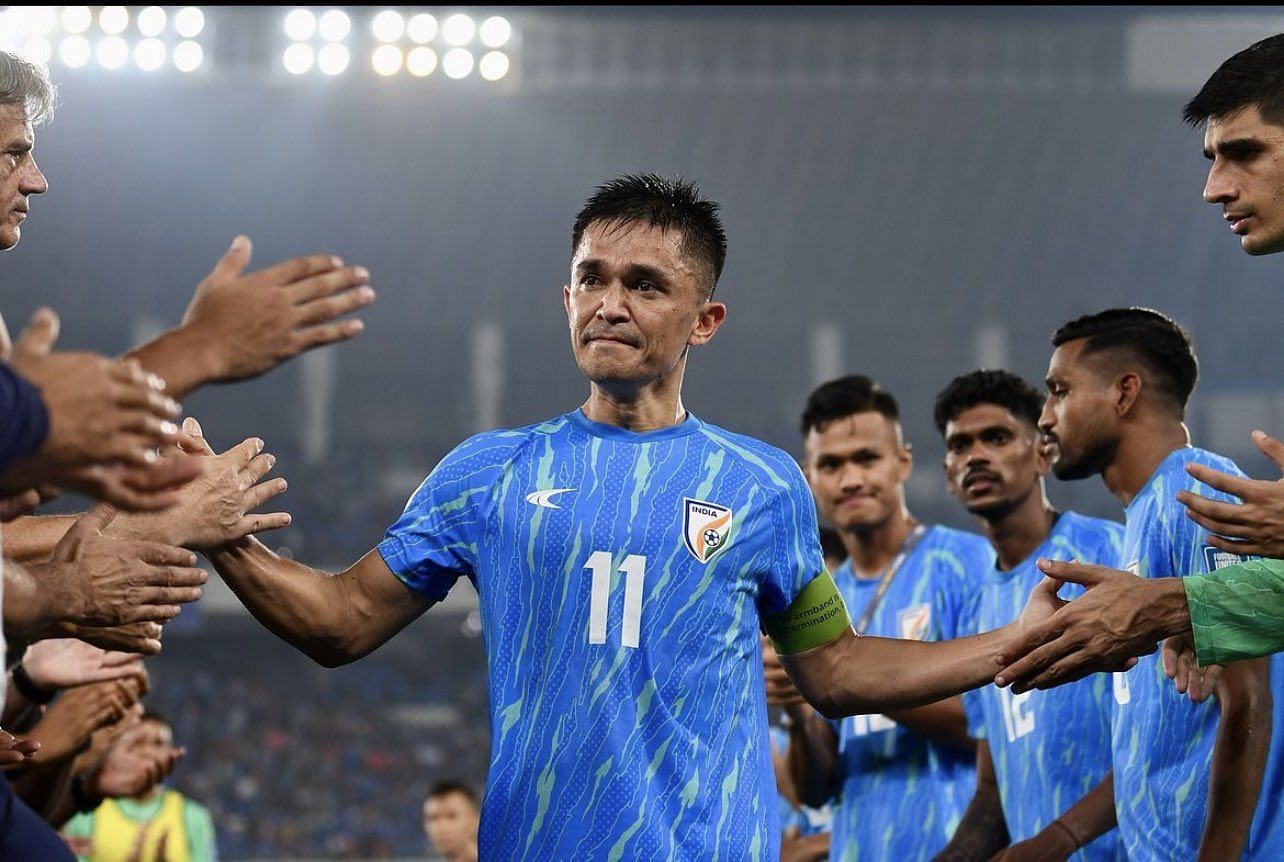
Sunil Chhetri wanted the focus on history beckoning for India, not his swansong; the drudged Kuwait stalemate underscores why none could
"I'm not sure whether you understand how big it is," Sunil Chhetri sighed, a hint of vexation shadowing his chiseled visage.
He had meticulously planned his international retirement announcement, spacing it out with almost flawless precision, even conducting a press conference in between to ensure the gravity of the Kuwait fixture wouldn't be overshadowed by the emotions surrounding his farewell.
Thus, it was only natural for Chhetri to feel a tinge of exasperation when questions about his retirement kept surfacing during the pre-match press conference for the World Cup Qualifier. Yet, displaying utmost courtesy, the 38-year-old diligently responded to every query, visibly striving to maintain the calm, composed demeanor we have come to admire over the years.
His argument was bulletproof too. A victory on Thursday, June 6, would realistically ensure India's pathway into the third round of the qualification stages - an unprecedented feat. Then, do you blame the journalists in the room for diluting the context? It isn't that simple.
Chhetri sells. His mention makes headlines and captures eyeballs. For nearly 19 years, as he donned the national Blues with pride, people fell in love with Sunil Chhetri, not necessarily Indian football.
Those invested in the Secunderabad-born striker's odyssey were prudent enough to realize the mediocrity that had consumed football in the country. Draped in all of his greatness, he stood out like a sore thumb - an anomaly.
Hence, even with the Blue Tigers standing at the brink of history, all the reporters could fixate on was Chhetri's departure. A folly of habit, one might presume. Or maybe of reason.
All skipped Sunil Chhetri's ought-to-be fairytale swansong, except the fans
Leading up to the Kuwait fixture, head coach Igor Stimac heralded it as the "biggest match of his career". Chhetri's teammates took turns addressing the media, emphasizing their deep desire to craft a poignant farewell for their revered skipper. The onus was also pushed onto the fans to foster an atmosphere worthy of the occasion.
Unsurprisingly, only one faction among those stakeholders answered the calls. Even with rains in parts of Kolkata threatening to dampen the occasion, a staggering 58,921 fans flooded the Salt Lake Stadium, adorned with Chhetri's name on the back and bearing countless memories of his brilliance in their hearts.
But they were met with a lackluster performance, with the Blue Tigers pitifully whimpering at the face of Kuwait's unyielding defensive discipline. Attacking impetus? Absent. Build-up play? Clumsy. Final-third decisions? Hasty.
Fans attempted to spur the team through their slump, but the players had figuratively turned a blind eye to their efforts. How long could those in the stands nurture this lopsided effort? Well, not for long. Soon, the euphoria dissipated, and the national team's vacuity beyond Sunil Chhetri laid bare.
Through the entirety of regulation time and a little over twelve minutes of injury time, India's lone substantial effort came through Rahim Ali's feeble strike from an acute angle early in the second half. Even the desperation, birthed from a thirst for victory, seemingly eluded the personnel on the pitch, and even off it.
As the referee let off the dreaded final whistle, audiences' eyes scoured through the pitch, landing on a somber-looking figure near the center circle. Chhetri's head bowed, sinewy arms gripping his hip, his eyes fixated on the blades of grass he had presumably befriended over the years.
After the game, all Stimac could remark was, "I feel really sorry for Sunil." Gurpreet Singh, Chhetri's longtime collaborator and the only one who performed on the night like his life depended on it, looked distraught. The rest gave a wide berth to any media interaction on the night. A disappointing result is still bearable, but the sheer lack of vigor? Shambolic.
His 151st appearance for the country was meant to be a celebration, a symbolic passing of the baton. Yet, seemingly none except the devoted fans had decided to show up to the party.
A telling happenstance, perhaps. Throughout his enduring international career, this was the everlasting relationship Sunil had fostered and nurtured. Administrators changed seats, coaches failed the test of time, teammates came and went, clubs perished, and new ones were birthed. Only stood there through this circus of Indian football was him and those bravehearts gracing the stands year after year, letdown after letdown.
Whenever the fans demanded, Chhetri delivered. Even when they almost stopped caring, his warm embrace and heroics drew them back. As he walked down the tunnel for the final time, hands folded, the overarching questions lingered: Why should the fans continue to devote themselves to an ordeal that had consistently dealt them the worst hand? Why would they, as thankless spectators, look beyond Sunil Chhetri, when even the stakeholders had failed to? Why would they still believe in miracles when the only one who promised them had bid farewell?